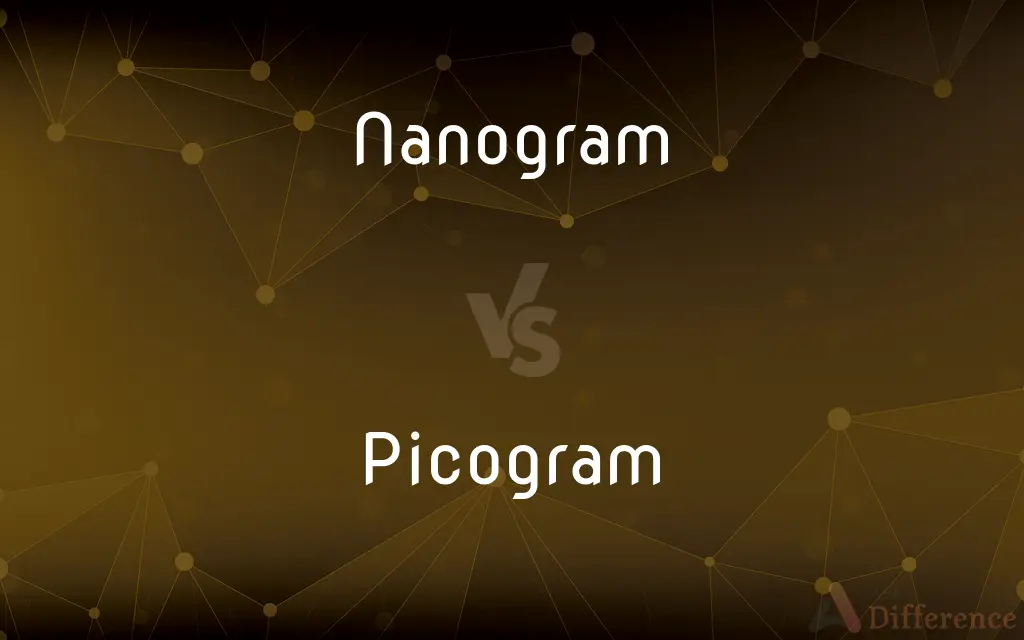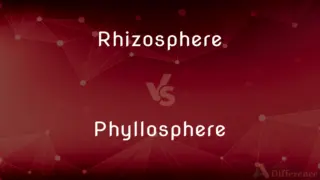Nanogram vs. Picogram — What's the Difference?
By Maham Liaqat & Fiza Rafique — Updated on May 3, 2024
A nanogram is 1,000 times larger than a picogram, measuring extremely small mass units in the metric system, significant in scientific calculations.

Difference Between Nanogram and Picogram
Table of Contents
ADVERTISEMENT
Key Differences
A nanogram, equivalent to one billionth of a gram, is a unit of mass used in science and medicine to measure very small quantities. Whereas a picogram is even smaller, measuring one trillionth of a gram, commonly used in chemical and biological experiments.
Nanograms are often used in contexts like drug dosing and laboratory tests, whereas picograms are utilized in genetic engineering and molecular biology due to their ability to measure extremely minute amounts. For instance, DNA samples might be measured in picograms.
While a nanogram might be suitable for assessing the quantity of a substance in a blood sample, a picogram is crucial for experiments requiring precise measurement of very tiny particles.
In fields like toxicology, a nanogram is a critical measurement unit, on the other hand, in genomics, picograms are indispensable for accurate assessments. Each unit plays a pivotal role depending on the required precision in scientific research.
Comparison Chart
Definition
One billionth of a gram (10^-9 grams)
One trillionth of a gram (10^-12 grams)
ADVERTISEMENT
Usage
Drug dosing, laboratory tests
Genetic engineering, molecular biology
Measurement Context
Suitable for larger quantities
Essential for extremely small quantities
Precision
Less precise than picograms
More precise than nanograms
Common Applications
Toxicology, pharmacology
Genomics, nanotechnology
Compare with Definitions
Nanogram
A unit of mass equal to one billionth of a gram.
The laboratory equipment measured the substance in nanograms.
Picogram
Crucial for measurements in molecular biology.
Scientists measure viral particles in picograms.
Nanogram
Commonly used in medical dosing and research.
The prescribed medication dosage was calculated in nanograms.
Picogram
A unit of mass equal to one trillionth of a gram.
DNA sequencing technologies often require picogram quantities of DNA.
Nanogram
Applicable in nutrition research.
Nutrient contents in food can be quantified in nanograms.
Picogram
Used in genetics for quantifying DNA and RNA.
Modern lab techniques can detect genetic material in picogram amounts.
Nanogram
Integral to pharmacology for precise measurements.
Accurate drug trials require measurements down to the nanogram.
Picogram
Necessary in nanotechnology for small-scale engineering.
Picogram precision is essential in the fabrication of nanoscale devices.
Nanogram
Used in environmental science to detect contaminants.
Soil samples were tested for pollutants at the nanogram level.
Picogram
Important in drug development at the molecular level.
Drug interactions at the cellular level are often measured in picograms.
Nanogram
One billionth (10-9) of a gram.
Picogram
One trillionth (10-12) of a gram.
Nanogram
A unit of mass equal to 0.000 000 001 grams. Symbol: ng
Picogram
A unit of mass equal to 0.000 000 000 001 grams. Symbol: pg
Nanogram
One billionth (1/1,000,000,000) gram
Common Curiosities
Why are picograms important in molecular biology?
Picograms allow for the precise measurement of very small quantities of biological molecules, crucial in experiments and analysis.
What equipment is needed to measure nanograms and picograms?
Highly sensitive scales and analytical balances are required to measure quantities as small as nanograms and picograms.
What is a nanogram?
A nanogram is one billionth of a gram, used for measuring very small quantities in various scientific contexts.
Can nanograms be used in environmental studies?
Yes, nanograms are used to measure environmental contaminants to understand pollution levels.
Are picograms used in technology?
Yes, picograms are used in nanotechnology and other high-precision engineering fields.
What is a picogram?
A picogram is one trillionth of a gram, ideal for extremely precise scientific measurements.
How many picograms are in a nanogram?
There are 1,000 picograms in a nanogram.
Which is smaller, a nanogram or a picogram?
A picogram is smaller than a nanogram.
What role do nanograms play in pharmacology?
Nanograms are crucial in pharmacology for measuring drug dosages and understanding their effects at low concentrations.
How do measurement needs differ between nanograms and picograms?
Nanograms are used when larger, albeit still minute, quantities need to be measured, whereas picograms are used for even smaller, more precise measurements.
Share Your Discovery

Previous Comparison
Rhizosphere vs. Phyllosphere
Next Comparison
Dice vs. DominoAuthor Spotlight
Written by
Maham LiaqatCo-written by
Fiza RafiqueFiza Rafique is a skilled content writer at AskDifference.com, where she meticulously refines and enhances written pieces. Drawing from her vast editorial expertise, Fiza ensures clarity, accuracy, and precision in every article. Passionate about language, she continually seeks to elevate the quality of content for readers worldwide.











































